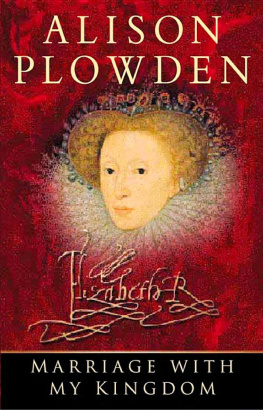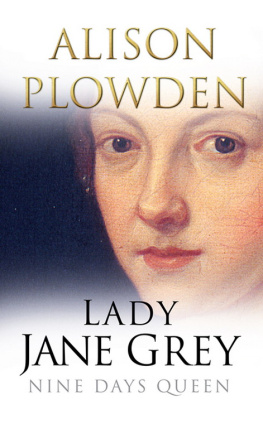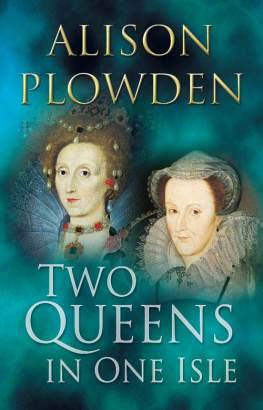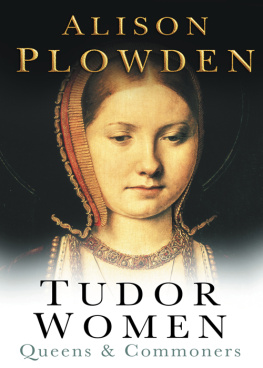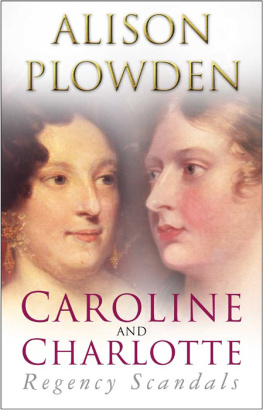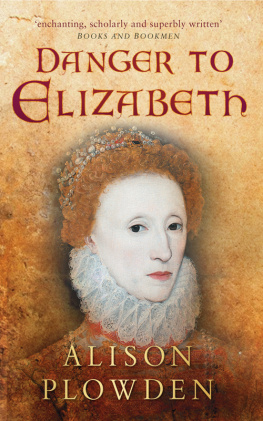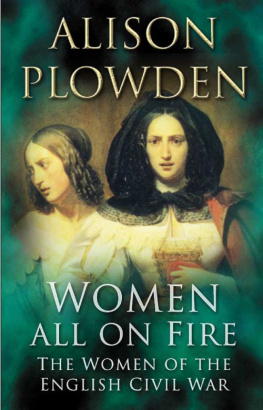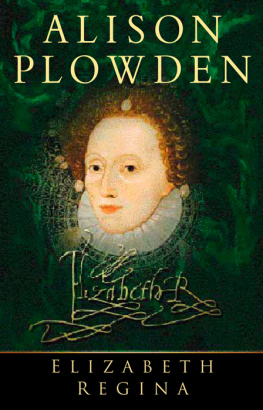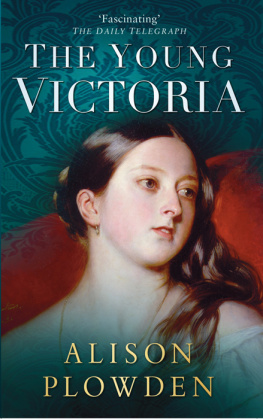Alison Plowden - Marriage With My Kingdom
Here you can read online Alison Plowden - Marriage With My Kingdom full text of the book (entire story) in english for free. Download pdf and epub, get meaning, cover and reviews about this ebook. year: 1999, publisher: History Press, genre: Non-fiction. Description of the work, (preface) as well as reviews are available. Best literature library LitArk.com created for fans of good reading and offers a wide selection of genres:
Romance novel
Science fiction
Adventure
Detective
Science
History
Home and family
Prose
Art
Politics
Computer
Non-fiction
Religion
Business
Children
Humor
Choose a favorite category and find really read worthwhile books. Enjoy immersion in the world of imagination, feel the emotions of the characters or learn something new for yourself, make an fascinating discovery.
- Book:Marriage With My Kingdom
- Author:
- Publisher:History Press
- Genre:
- Year:1999
- Rating:5 / 5
- Favourites:Add to favourites
- Your mark:
- 100
- 1
- 2
- 3
- 4
- 5
Marriage With My Kingdom: summary, description and annotation
We offer to read an annotation, description, summary or preface (depends on what the author of the book "Marriage With My Kingdom" wrote himself). If you haven't found the necessary information about the book — write in the comments, we will try to find it.
Marriage With My Kingdom — read online for free the complete book (whole text) full work
Below is the text of the book, divided by pages. System saving the place of the last page read, allows you to conveniently read the book "Marriage With My Kingdom" online for free, without having to search again every time where you left off. Put a bookmark, and you can go to the page where you finished reading at any time.
Font size:
Interval:
Bookmark:
And therewith she drew the Ring from her Finger, and shewed it, wherewith at her Coronation she had in a set form words solemnly given her self in Marriage to her Kingdom.
William Camden, Annals of the Reign of Queen Elizabeth
Marriage With My Kingdom
The Courtships of Elizabeth I
On or about 28 August 1556 a young Englishman, with his hawk on his wrist, took a gondola out of Venice hoping to enjoy a days sport among the islands. But the bad luck which had dogged Edward Courtenay, Earl of Devonshire, throughout his life pursued him even across the Venetian lagoon. A violent squall of wind and rain caught him on the tiny, shelterless island of Lio and the young man in his light summer clothes was quickly soaked to the skin. A gondola was useless in such conditions, and the Earl and his party were fortunate to be picked up by a Venetian naval craft cruising in the area.
Edward Courtenay was travelling abroad at his sovereigns command rather than his own inclination. He took no part in the social round of Venice, keeping himself resolutely to himself and admitting to his friendship only a small group of those gentlemen eager to make much of the romantic English milord. Five days after his adventure on the lagoon, which had brought on an attack of malaria, the Earl of Devonshire had a fall on the stairs of his house and decided to move to Padua. The University of Padua was famous for its medical school, and an invalid could expect to receive the most up-to-date treatment from the citys doctors.
Most people travelled the twenty-five miles from Venice by water, patronising horse-drawn barges which plied up and down the River Brenta. But Edward Courtenay, either from obstinacy or impatience, took the worst way and came by a certain waggons called coches a form of transport which, in the opinion of Peter Vannes, Queen Marys agent in Venice, was very shaking and uneasy. Vannes was himself temporarily resident in Padua to avoid the plague which reigned in Venice during the summer months. News of the Earl of Devonshires arrival reached him late on Saturday night, and next morning he hastened to pay his respects to the distinguished visitor. Vannes found the Earl very weak and feverish after his uncomfortable journey, and although two of the best available physicians were summoned to his bedside his condition deteriorated rapidly. The last representative of the old royal house of England, whose grandmother had been a Plantagenet princess, lay alone in his lodgings, gripped by a continual great hot ague, nursed only by his servants, too ill to see anyone but Peter Vannes and the Italian doctors.
The end came on 18 September. Vannes reported that he believed the Earl of Devonshire had died a good Christian who could hope for Gods
Knowing that news of Edward Courtenays death would come as a considerable relief to at least one European power and as a serious disappointment to another, Peter Vannes took the precaution of securing sworn statements from the Earls servants, from the physicians who had attended him and the surgeons who had carried out the post-mortem examination that to the best of their knowledge he had died from natural causes.
Half a century later, an English tourist exploring St Anthonys Church in Padua was deeply shocked when a plain wooden coffin containing the mortal remains of Edward Courtenay, Earl of Devonshire, was pointed out to him stacked casually in the cloister and having neither epitaph nor any other thing to preserve it from oblivion. It was then five years since the House of Tudor had followed the House of Plantagenet off the stage, and the name of Edward Courtenay had long since been forgotten. Worthy Thomas Coryat, gazing on the sight of a noble Englishman so ignobly buried, was struck by compassion and remorse. He was not aware that he was also looking at the last resting-place of a man who, as the predestined bridegroom of Elizabeth Tudor, might so easily have altered the whole course of English history.
When Anne Boleyn gave birth to a girl between the hours of three and four oclock on the afternoon of Sunday, 7 September, 1533, Catholic Europe sniggered behind its hands over the devastating snub which Providence had dealt the King of England and his concubine. Messire Eustace Chapuys, the Holy Roman Emperors ambassador at the Court of St Jamess, did not attempt to conceal his malicious amusement.
Te Deum for Queen Annes safe delivery was sung in St Pauls Cathedral in the presence of the Lord Mayor and Aldermen of the City of London, and the high and mighty Princess of England, Elizabeth, was given a splendid christening in the Friars Church at Greenwich. Over these proceedings, however, there hung a faint but palpable air of defiance. No amount of pompous ceremony and displays of official rejoicing could conceal the embarrassing fact that the flamboyantly masculine Henry VIII had once more failed to get a legitimate son. In his quest for a male heir, Henry had repudiated his blameless first wife and offended her influential relatives; he had challenged the Pope and resigned from the Church of Rome; he had ruthlessly manipulated the accepted laws of God and man to suit his own ends and all he had got for his pains was another daughter.
In 1533 the break with Rome was not yet irrevocable. In July, Pope Clement had solemnly condemned the Kings separation from Catherine of Aragon, denounced his second marriage and framed (but not published) a bull of excommunication. But still the way to reconciliation was not finally barred. For years now Clement had temporised and delayed in the matter of the King of Englands divorce. If he could have devised some face-saving formula, he would, even at this eleventh hour, have used it thankfully. As for Henry, if he had been offered a settlement on his own terms, he might, even now, have accepted it. The Kings position was not unlike that of a man who has quarrelled with the committee of his club and left to set up a rival establishment, but who, at the same time, cherishes a sneaking desire to be invited to return.
After this, nothing short of unconditional surrender by one party or the other could heal the breach between England and Rome.
The Kings divorce, the Great Matter which had occupied Henrys thoughts and energies almost exclusively for the past seven years, had come to overshadow every aspect of English domestic and foreign policy, and had had the effect of forcing the country further and further into the arms of France. France might remain the ancestral enemy, Spain the traditional ally, the Netherlands now a Spanish apanage the trading partner on which Englands economic prosperity depended; but unfortunately Charles V ruler of Spain, Lord of the Netherlands, the Franche-Comte and Austria, King of Naples, Sicily and Sardinia, suzerain of the Habsburg fiefs in Germany and northern Italy, and Holy Roman Emperor also happened to be the nephew of the discarded Queen of England. Charles, with the cares of half Europe on his shoulders, menaced by advancing Turkish hordes in the east, harassed by heresy in Germany and by French territorial ambitions in Italy, was naturally reluctant to add war with England to his problems. Common decency and the obligations of family honour compelled him to protest at the humiliation of his aunt, and to promote her cause by all the diplomatic means at his disposal. More than that he had not, so far, been prepared to do. At the same time, the Empire represented the greatest power-bloc in Europe and the Emperor could, if sufficiently provoked, make things very uncomfortable for the King of England. It had, therefore, seemed a necessary precaution to strengthen English ties with France. In 1532 a new defensive treaty was negotiated between the two countries and in September of that year the
Next pageFont size:
Interval:
Bookmark:
Similar books «Marriage With My Kingdom»
Look at similar books to Marriage With My Kingdom. We have selected literature similar in name and meaning in the hope of providing readers with more options to find new, interesting, not yet read works.
Discussion, reviews of the book Marriage With My Kingdom and just readers' own opinions. Leave your comments, write what you think about the work, its meaning or the main characters. Specify what exactly you liked and what you didn't like, and why you think so.

